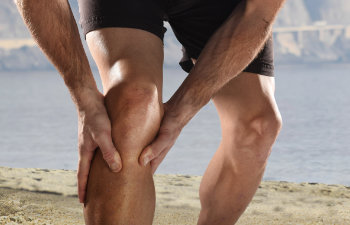
Patellofemoral Pain Syndrome (PFPS) causes pain in the front of the knee. It results from an imbalance in the forces acting on the kneecap, which can cause irritation and damage the surrounding tissues. PFPS can affect people of all ages and activity levels, but it is more common in athletes and people who engage in activities involving knee bending and twisting.
Let’s discuss some of the conditions that can contribute to the development of PFPS.
Weak Muscles
Weakness in the muscles around the knee can cause an imbalance in the forces acting on the kneecap. The quadriceps, which are the muscles on the front of the thigh, are particularly important in stabilizing the kneecap. When these muscles are weak, the kneecap can move out of its normal position and irritate the surrounding tissues. Weakness in the hip muscles can also contribute to PFPS, as it can cause abnormal movement patterns in the lower limb.
Overuse or Trauma
PFPS can also be caused by overuse or trauma to the knee. For example, repetitive activities such as running, jumping and squatting can put a lot of stress on the knee joint and contribute to the development of PFPS. In addition, trauma to the knee, such as a fall or direct blow, can also cause damage to the surrounding tissues and lead to PFPS.
Flat Feet
Flat feet, also known as overpronation, can contribute to the development of PFPS. When the feet overpronate, it causes the lower leg to rotate inward, which can alter the alignment of the kneecap and increase the forces acting on it. This can cause irritation and damage to the surrounding tissues.
Patella Alta
Patella Alta is a condition where the kneecap sits higher than usual in the knee joint. This can cause the kneecap to track abnormally, leading to irritation and damage to the surrounding tissues. Patella Alta can be congenital or acquired. It is more prevalent in females than in males.
Tight Muscles
Tightness in the muscles surrounding the knee can also contribute to the development of PFPS. Tight muscles can alter the alignment of the knee joint and increase the forces acting on the kneecap. This can cause irritation and damage to the surrounding tissues.
You should see a specialist if your knee hurts to find out why. At the Robotic Joint Center, we specialize in diagnosing and treating knee conditions, including PFPS. Our team uses the latest tools and methods to give our patients personalized and effective care.
If you are experiencing knee pain or suspect you may have Patellofemoral Pain Syndrome, contact Robotic Joint Center today to schedule a consultation. We are dedicated to helping you get back to the activities you love.
Posted on behalf of
New York, NY 10021
Phone: (212) 308-3089
FAX: (646) 844-1396
Email: Info@RoboticJointCenter.com
Mon – Fri: 9 AM – 6 PM